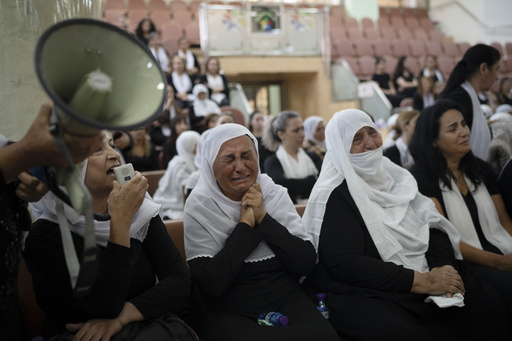Two days after a tragic incident in which a rocket struck a soccer field in the Israel-controlled Golan Heights and resulted in the deaths of 12 children, there are many unanswered questions surrounding the attack on the Druze town of Majdal Shams. Israel has accused Hezbollah in Lebanon of deliberately targeting civilians, while Hezbollah has vehemently denied any involvement in the strike. The attack has prompted Israel to vow retaliation for the highest civilian death toll in Israel-held territory since a previous attack by Hamas on October 7th. Diplomatic efforts are underway to prevent further escalation that could potentially lead to a full-blown war following ongoing tensions between Israel and Hezbollah along the border.
The strike left a significant crater on the soccer field where the children were playing, surrounded by burnt bicycles and scooters, along with damaged walls of nearby structures. The Israeli military stated that an Iranian-made Falaq rocket with a warhead belonging to Hezbollah was responsible for the attack. Evidence suggests that the rocket may have been launched from Lebanon, with the projectile landing in Majdal Shams, a town with over 11,000 residents. The Israeli military is investigating why their Iron Dome missile defense system did not intercept the rocket, despite detecting the launch.
Hezbollah, a powerful force in Lebanon, quickly denied any involvement in the attack, a departure from their usual practice of claiming responsibility for such actions. The motives behind targeting a Druze community remain unclear, as such an attack could potentially harm Hezbollah’s relationships within the region. While Hezbollah has previously targeted military installations, the strike on Majdal Shams marked a significant escalation in the conflict.
Experts have indicated that the damage caused by the rocket aligns with characteristics of a rocket artillery attack rather than a malfunction of an air defense missile. Further investigations are ongoing to determine the exact circumstances surrounding the incident and ascertain accountability. The Druze community, divided among Lebanon, Syria, and Israel, has expressed solidarity in the aftermath of the attack, with many rejecting attempts to sow discord within their tight-knit community.
Residents of Majdal Shams, many of whom still view themselves as Syrian citizens despite living in an annexed part of the Golan Heights, have called for peace and unity in the face of the tragedy. The incident has left deep scars on the community, with one local medic recounting the harrowing aftermath of the attack and emphasizing the desire for peace and reconciliation amidst the grief and loss.



